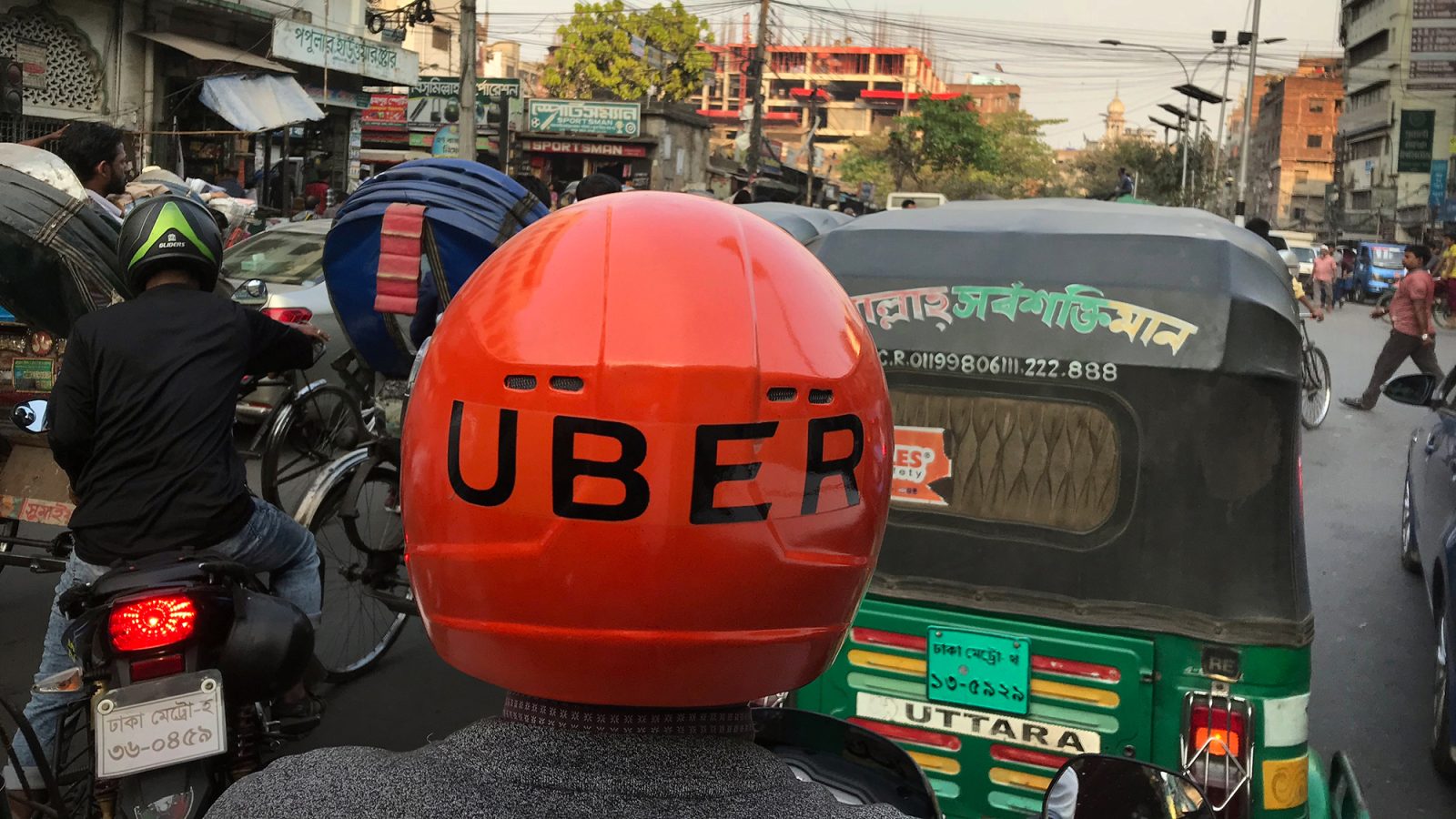Jitu Jisan is a Pathao bike-taxi driver in Dhaka. But, he said, taking bookings through the ride-hailing app is always the last resort for him. Typically, he uses the Pathao app only to find a customer, and once he meets them, he turns off the app, strikes a direct deal, and goes khep.
Khep is a popular colloquial term used for gig drivers bypassing platforms like Pathao and Uber in Bangladesh. In Bangla, khep translates to “side hustle.” “We’d rather khep than work on the apps. All the effort is from [the drivers’] end anyway,” Jisan told Rest of World. “The motorcycles are ours, the bills for petrol are ours, it’s our hard work. Platforms only help by getting us on the apps, and even for that, they’re charging a commission.”
Over 60% of respondents in an April 2023 survey of 59 commuters in Bangladesh said they had taken khep riders in 2023, according to a study conducted by a group of researchers associated with BRAC University in Dhaka. It is estimated that there were 7.5 million rides per month across the country in 2020, and earlier this year, the research director at Bangladesh Institute of International and Strategic Studies said that the ride-sharing market is the largest segment within the country’s gig economy, worth $259 million in 2023 and expected to grow to $1 billion in the next five to seven years.
read more: https://restofworld.org/2023/uber-commission-fees-bangladesh/
Thats amazing. Its like they are ‘pirating’ uber. I love it.
Happens a bit in India too. More frequently in some cities than other.
I’ve had a few drivers do this in the US and it has always been a huge cost savings. Uber gives a smaller and smaller cut the the drivers from what I’m hearing. I miss the early days when rides were cheap, driver kept the lions share of the fare and no one was expected to tip.
Yeah, but they only could provide that by burning a LOT of money in order to gain a monopoly and then squeeze everyone dry. Uber has always been a venture capital sham: https://pluralistic.net/2022/02/11/bezzlers-gonna-bezzle/
What I find fucked up in the first place, is how these business models don’t even work in the first place. Like why in the hell am I spending so much on a trip and it’s not even profitable in the first place.
Startup culture isn’t the most efficient. For example, back when Twitter still existed their iOS team had more than 100 people. I was an iOS developer back then, and I could easily have made a similar product alone (just the client, not the server). I don’t think that Tweetbot had more than one developer, and they produced much higher quality than that Twitter team.
Also remember that (former) Google employees who published a video about their work day, where they spent about 30mins for actual work and the rest was R&R.
That’s what made it good. Just because it’s not sustainable doesn’t mean it’s bad for the users. It’s the opposite. The problem is people who decided to hitch their lives on the app and be an Uber driver as a career. That was obviously not sustainable. And now people complain that it’s not profitable anymore. Time to move on
EDIT: downvoted for an anti-corporate opinion on Lemmy? Make up your minds!
You’re giving a descriptive explanation for a normative debate… or whatever is the one with the correct meaning.
Uber and Pathao are now piloting a subscription plan for ride-sharing drivers, where they are not charged commissions on each ride.
So they can operate without skimming from drivers. Seize the means of production.
This sounds more like it’s always charging a constant rate so it doesn’t matter if they do this it not, uber gets paid. This sounds much worse, imo.
You can choose how you get screwed and pick the least worst option!
Imagine an open source platform for this service.
Problem here is that “Open source platform” is a meaningless term. Open Source is a type of license that regulates how to redistribute source code. None of those principles apply to services and platforms, which are about data and control. If the Uber app would be Open Source, but still had to connect to the Uber server and play by its rules, nothing would change. Meanwhile if it played by its own rules, what rules would that be? There are no established rules for an “open” service platform, especially not when it comes to platform that have review and reputation systems build in.
Simply put, it’s really not clear how you can be “open” yet at the same time provide any level of protection against fraud and abuse.
Dreaming is free, so here’s my list:
- FOSS
- Federated
- E2EE
- Accepts Cash & Crypto Payments
- Easily self hosted
- Open ID
How would you ensure safety of drivers and passengers with open source platforms?
Wouldn’t you need some sort of centralized authority to take on that risk and enforce rules to be followed and ban certain people from the platform?
removed please. As if uber gives 2 shits about secruity. They are an app platform? What are you going to do, run into a local tech park and shout at the receptionist “EMERGENCY!”. They will kick you out fast like they do a hobo in NYC.
Doesn’t sound profitable to me
Ah yes, because everything in life is about profit for yourself, instead of changing other people’s lives by enabling them to work.
Ok why don’t you fund it yourself then
Because I am funding another FOSS project that is saving lives
Profitable for who? The one hosting it foots the bill. If it was federated, all drivers could host their own instance like WordPress and a single app would connect to all instances and all drivers.
Agencies could start up to manage the tech for a negotiable fee if the drivers in the area didn’t want to bother with the tech.
Whether or not it could be profitable entirely depends on the hosting and delivery model. One guy could host the tech stack and charge maintenance fees and be in the green.
If you mean rich, then yeah, nobody would probably be rich. But you can build a small business as a hosting provider no problem, and the drivers would probably get a better deal. Uber employs so many people it requires they charge money. There’s a tipping point when the service provider becomes so large that their sheer operating expenses start to necessitate increased costs. Breaking up provides better value in that case.
You can’t trust tiny random “self-hosted” Uber services. They could use any random drivers with criminal records, or even without drivers licenses. They could have terrible cars and charge extra fees. You would never be able to trust the driver ratings. They could tell you the car will arrive in 5 minutes for 30 minutes.
These are all the problems people had with small taxi companies. Why would you replicate that in an app?
You can’t
You can - the software would have to hook into a background check service. This can absolutely be done.
“according to a study conducted”
59 people surveyed
This is why paid, professional journalism is important. Basic editorial effort would refuse to publish lines regurgitating junk science
I could get a bigger sample size by spending an afternoon asking people on the street!
“Paid professional journalists” produce this kind of garbage too.
I don’t know what the answer is.
Kudos to Dhaka taxi drivers. All these exploiting corporations, especially Uber, can go to hell!
No surprise, Uber and others will price only for their easiest big profit. Full support to the drivers
What usually happens in Guatemala is you’ll take one ride with them through Uber and if they seem cool and are from your area you get their number and just message them in the future to ask for a ride.




